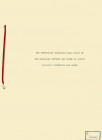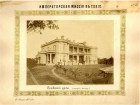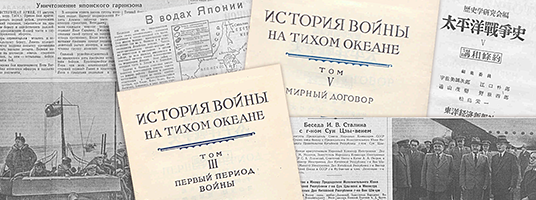Political Relations
Captain Ricord's fleet notes on his voyage to the Japanese shores in 1812 and 1813 and about his relations with the Japanese
St. Petersburg: in the Marine Printing House, 1816.
The draft letter of the State Chancellor KV Nesselrode to the Japanese Supreme Soviet expressing gratitude on behalf of the Emperor for the help rendered to the Russian expedition and with a request to receive 52 weapons from the frigate "Diana"
1856.
Letter from the Minister for Foreign Affairs of Japan, Terasima Munenori, to Chancellor A. M. Gorchakov on the appointment of Yoshimoto Khanabus as Charge d'Affaires of the Mission of Japan in St. Petersburg
1873.
Translation of the speech delivered by the envoy of Japan to Russia, Enomoto Takeaki, when they presented their credentials to Emperor Alexander II
1873.
Reports of the Russian envoy to Tokyo KV Struve to the Minister of Foreign Affairs NK Girs on awarding Emperor Alexander II with the Great Imperial Order of the Chrysanthemum
1877.
Attitude of the Director of the Asian Department of the Ministry of Foreign Affairs of the Russian Federation IA Zinoviev to the Russian envoy to Tokyo, DA Shevich, about the admission of Japanese Princess Komatsu and her Hofmeisterin Sannomiya to the Russian Red Cross Society, and awarding him the distinctions of this Society of 1st and 2nd degree respectively
1889.
On the establishment of Japanese consular posts in the cities of Vladivostok, Nikolaevsk and Petropavlovsk
Correspondence of the Chairman of the Council of Ministers with various institutions and persons on various issues: on the release of funds to work on the installation of the Enzelian port;about the conditions for renting a state -owned Iletsky salt fishing;on the transfer to the peasant land bank of the specific lands of the Belsky Specific District;On the construction of Japanese consular institutions in Vladivostok and Nikolaevsk on the Amur of the Primorsky Region and other
Representation of the Ministry of Foreign Affairs in the Council of Ministers on March 19, 1911 on the conclusion of a convention between Russia and Japan on the mutual extradition of criminals and persons accused of anti-government statements
1911.
Telegrams from Chekino-Chuchkovo about the diplomatic negotiations of the government of the Far Eastern Republic (DFR) with the Japanese commanders, the condition of refrigerators in the Chelyabinsk province and other issues
Telegrams from Chekino-Chuchkovo about the diplomatic negotiations of the government of the Far Eastern Republic (DFR) with the Japanese command, the state of refrigerators in the Chelyabinsk province and other issues.
Pages
- Protocols, charters and treaties
The draft charter of Emperor Nicholas I to the Emperor of Japan on sending Vice Admiral E. Putyatin to Japan and the desire to establish trade relations
Russia. The Emperor (1825-1855; Nicholas I). The draft charter of Emperor Nicholas I to the Emperor of Japan on sending Vice Admiral E. Putyatin to Japan and the desire to establish trade relations. 1852.The credentials of the Extraordinary Envoy and Plenipotentiary Minister of Japan to Russia, Vice-Admiral Enomoto Takeaki
The credentials of the Extraordinary Envoy and Plenipotentiary Minister of Japan in Russia, Vice-Admiral Enomoto Takeaka.
1873.Charter of the Japanese government on awarding Moscow with the Japanese Order of the Double Rising Sun
Charter of the Japanese government on awarding Moscow with the Japanese Order of the Double Rising Sun.
1883.Protocol on the opening of consulates in Russia and Japan, signed on July 15/28, 1907.
Protocol on the opening of consulates in Russia and Japan, signed on July 15/28, 1907.
St. Petersburg: Senate Printing House, 1907.Charter of the Japanese government on awarding an employee of the Russian embassy Andrei Mandelstam with the Japanese Order of the Sacred Treasure of the 3rd degree
Charter of the Japanese government on awarding an employee of the Russian embassy Andrei Mandelstam with the Japanese Order of the Sacred Treasure of the 3rd degree.
1908.Convention on the Basic Principles of Relations between the USSR and Japan
THE USSR. Contracts Convention on the Basic Principles of Relations between the USSR and Japan.
Beijing, January 20, 1925.Joint Declaration of the Union of Soviet Socialist Republics and Japan
Joint Declaration of the Union of Soviet Socialist Republics and Japan. Moscow, October 19, 1956.Tokyo Declaration on Russian-Japanese Relations
Tokyo Declaration on Russian-Japanese Relations.
Tokyo, October 13, 1993.The Moscow Declaration on the Establishment of a Creative Partnership between the Russian Federation and Japan
Russian Federation. President (1991-1999, Boris N. Yeltsin). Moscow Declaration on Establishing a Creative Partnership between the Russian Federation and Japan.
Moscow, November 13, 1998. - Visual materials
Photo of the main house (front facade) of the Russian Imperial Embassy in Tokyo
Photo of the main house (front facade) of the Russian Imperial Embassy in Tokyo. November 11, 1877.Photo of the building of the Russian Imperial Consulate in Yokohama
Photo of the building of the Russian Imperial Consulate in Yokohama.
1902.Photo of the parade hall of the Russian Imperial Embassy in Tokyo
Photo of the parade hall of the Russian Imperial Embassy in Tokyo. January 12, 1915. - Russo-Japanese War of 1904-1905
A series of turbulent events of the 20th century began for Russia from a war far in the east. Japan, which unleashed the war, blockaded and besieged Port Arthur, the main base of Russian naval forces in the Pacific. The defense and the subsequent surrender of the fortress became a tragic symbol of the war. Military setbacks, the largest of which were the overland Battle of Mukden and the Tsushima Naval Battle, the name of which became common, were one of the causes of the revolution of 1905-1907 forcing the Russian part to agree to a compromise and sign a peace treaty. The local war turned for Russia into the loss of the entire Navy and the loss of strategic positions in the Far East.
- Soviet-Japanese War of 1945
The entry of the USSR into the war with Japan was agreed upon at the Yalta Conference and confirmed at the Potsdam Conference. The circumstances surrounding the declaration of war, as well as the 1941 Neutrality Pact with Japan, are of particular interest. Unique declassified materials from World War II archives allow us to reconstruct the sequence and logic of events. To make it easier for readers, Presidential Library has included the most important documents in a collection dedicated to the Soviet-Japanese war.


























About the establishment of Japanese consular institutions in Vladivostok and Nikolayevsk-on-Amur of Primorskaya Oblast (scans 53)